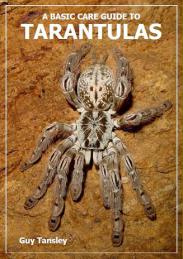
Megaphobema Pocock, 1901 is represented by two species and all are large terrestrial spiders ranging from Central and South America. All with thrive in a
typical terrestrial set-up (deep substrate to allow for burrowing, cork bark/flowerpot hide and water dish) with average temperatures and humidity (some prefer it drier, se below for more
info).
Common species in captivity:
M. robustum (Ausserer, 1875) -
Colombia
A freshly moulted specimen of M.
robustum is a striking sight. The entire body is clothed in fiery orange hairs and these are
especially apparent on leg iv. A very nervous species that will readily assume a characteristic offensive position with abdomen raised at the slightest disturbance. For this reason a suitable retreat
is essential as it needs to feel secure in it's environment. There is wide colour variations within this species and some show very little orange colouration, being simply drab brown even when
freshly moulted. A copious hair-kicker, M.
robustum will often be completely bald unless rarely disturbed and definitely not recommended for
the beginner or handling. Despite their disposition, breeding is usually a clam affair with the male rarely being attacked. It is only recently being bred in any great numbers so still quite sort
after, prices remain high.
M. velvetosoma Schmidt, 1995 -
Ecuador
Similar in build to M.
robustum but coloured a more uniform brown. A nervous species that with kick urticating hairs
readily often resulting in a bald abdomen. A retreat is recommended to make the spider feel more secure. Not often available as captive bred
spiderlings, M.
velvetosoma is relatively rare in collections due to lack of
breeding success.

